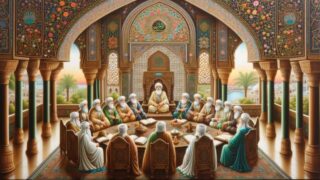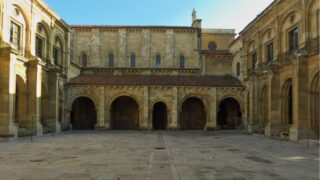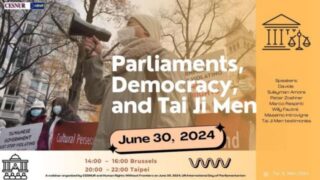Prosecutors often raid discriminated religious and spiritual groups and secure the complicity of the media to create a sort of baroque theater.
by Massimo Introvigne*
*A paper presented at the seminar “Abusive Taxation and Denial of Justice in Taiwan. Tai Ji Men: A Case of Abusive Taxation of Individual Gifts,” co-organized by CESNUR and Human Rights Without Frontiers in Brussels at the Press Club Brussels Europe on May 4, after the United Nations World Press Freedom Day (May 3).


World Press Freedom Day celebrates the brave journalists who risk their liberty, and often their life, to report freely and independently. Sadly, we have several examples of reporters who died because of their passion for the truth in the current Ukrainian war.
There is, however, a dark side of press freedom. Some reporters are not free because they are persecuted, arrested, and detained. Others are not free as they willingly contribute to spread fake news, either because of monetary or ideological corruption. Again, there are several examples in the war in Ukraine.
In 2016 American sociologist Stuart Wright and Susan Palmer, a well-known Canadian scholar who has been a speaker in one of our Tai Ji Men webinars, published an important book whose title was “Storming Zion: Government Raids on Religious Communities.” It was published by Oxford University Press, arguably the most authoritative academic press in the world.
The subject matter of that book was the raids conducted by prosecutors and the police against religious or spiritual communities discriminated as “cults” in several countries. These raids are routine in non-democratic countries. For example, Bitter Winter has covered a raid of October 4, 2021, in Irkutsk, Siberia, where the homes of the local Jehovah’s Witnesses, a group prohibited in Russia, were stormed by the special police OMON at 6 a.m. The Jehovah’s Witnesses were beaten and in some cases even tortured.
We are saddened but not surprised when these incidents happen in totalitarian countries. However, the book by Wright and Palmer is about democratic countries. Religious and spiritual minorities have been raided in France, Germany, Italy, and even in the United States, sometimes with tragic consequences. At a recent webinar I also attended, Susan Palmer said she should have added the cases of MISA in Romania and the Guru Jára Path in the Czech Republic, which I have documented and followed the same scheme.


All these raids follow the same scheme: prosecutors announce that serious crimes are being committed by a spiritual movement, they employ disproportionate and heavily armed forces, usually start the raid in the early hours of the morning, alert the media and come with reporters and camera operators—and in most cases they do not find anything. It is true that in some cases, including MISA, the leaders have been indicted for charges of sexual abuse, often trumped up, but not because of anything found in the raids. You do not need to take my word for that.
In the case of MISA, the Swedish Supreme Court refused to extradite the leader to Romania, as it believed the sexual abuse charges were trumped up, and the European Court of Human Rights sentenced Romania in 2016 to pay damages to the victims of the raid, which it called disproportionate and conducted in violation of human rights.
In my book on MISA, I have compared these raids to baroque theater, a form of entertainment famous for its excesses, which served the purpose of educating the populace and mobilizing it against the enemies of the Catholic Church and the states. The anti-cult raids rarely serve any useful law enforcement purpose, and mostly function as the baroque theater, showing to media and society that prosecutors are tough about movements labeled as “cults,” and that the latter will not be tolerated.
When Prosecutor Hou Kuan-Jen raided Tai Ji Men in 1996, he was perpetuating this model. Perhaps he was not familiar with examples abroad, but he could find precedents in Taiwan as well, As Professor Tsai evidenced in a 2021 article, in 1974 a violent crackdown targeted The New Testament Church, a Pentecostal movement founded by Christian Hong Kong movie star Mui Yee, whose headquarters had been moved after the founder’s death in 1966 to Mount Zion, near Kaohsiung, in Taiwan.
The “Mount Zion Incident” began in March 1974, when the military and the police jointly raided the community and arrested several members. A second and equally violent raid, where devotees were badly beaten and some died, targeted members of The New Testament Church around Taiwan in 1985.


What all these raids, in Taiwan and internationally, have in common is the prosecutors’ use of the baroque theater model to teach both members of the targeted movements and the general public that the state, which is all-powerful, has decided they should not exist. However, the show can be successful only with the support of embedded media.
Not only journalists are allowed to accompany the prosecutor and the police during the raids. Prosecutors feed the media before and after the raids with fake news and “atrocity tales,” which depict the movements as so bad that violence against them is justified. The role of the media is, thus, capital in leading the public opinion in democratic countries to accept inherently non-democratic actions and procedures.
The Tai Ji Men case followed the same model. Prosecutor Hou advertised the raids and the prosecution, breaching all procedural rules of confidentiality, and spread fake news through the media, including the absurd charge that Dr. Hong Tao-Tze, the leader of Tai Ji Men, was “raising goblins.”


Nonetheless, a difference remains between democratic and totalitarian countries. In the latter, the possibility that courts of law declare the raid and the prosecutors wrong and find the defendants not guilty does not exist. It does in democratic systems, and even if Taiwan as a democracy has its problems Dr. Hong and his co-defendants were declared not guilty up to the Supreme Court and were even compensated for the time they had unjustly spent in detention after the raid.
However, Dr. Hong and Tai Ji Men, despite having been found innocent of tax evasion as well, continued to be persecuted through ill-founded tax bills. Once again, the slander spread through the media was aimed at paralyzing their rightful protests. These media were not innocent victims of a misunderstanding: they were corrupted, at least ideologically, and ready to sell their soul to the devil for a sensational story, no matter whether true or false.
As we celebrate the World Press Freedom Day, we should tell journalists that we are here to defend their freedom, but cannot defend them against themselves.









